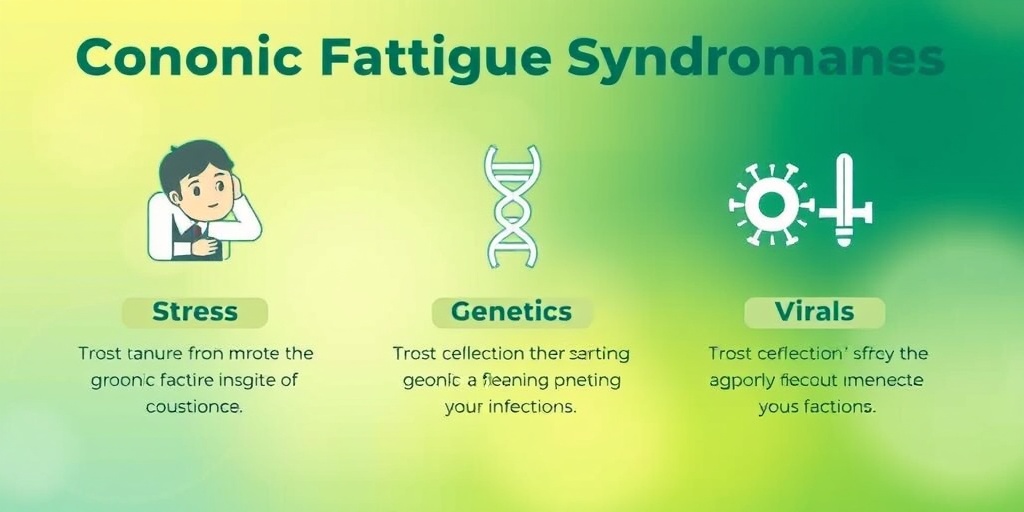What Is CFS?
Chronic Fatigue Syndrome (CFS), also known as Myalgic Encephalomyelitis (ME), is a complex and debilitating condition characterized by extreme fatigue that lasts for at least six months and is not improved by rest. This fatigue significantly interferes with daily activities and is often accompanied by a variety of other symptoms. Despite its name, CFS is not simply about feeling tired; it can profoundly affect a person’s quality of life.
The Nature of CFS
CFS is a multifaceted disorder that can manifest in different ways for different individuals. The exact cause of CFS remains unclear, but it is believed to involve a combination of genetic, environmental, and psychological factors. Some researchers suggest that viral infections, immune system dysfunction, and hormonal imbalances may play a role in its development.
Who Is Affected by CFS?
CFS can affect anyone, but it tends to occur more frequently in certain populations. Studies indicate that it is more common in women than men, and it often develops in individuals aged between 30 and 50. However, children and older adults can also be affected. The condition can be particularly challenging for those who are active and engaged in demanding careers or lifestyles, as the sudden onset of fatigue can be both surprising and debilitating.
CFS Symptoms
The symptoms of Chronic Fatigue Syndrome can vary widely among individuals, making it a challenging condition to diagnose and manage. Here are some of the most common symptoms associated with CFS:
1. Persistent Fatigue
The hallmark symptom of CFS is profound fatigue that does not improve with rest. This fatigue can be exacerbated by physical or mental exertion, a phenomenon known as “post-exertional malaise.” Individuals may find that even simple tasks become overwhelming.
2. Sleep Disturbances
Many people with CFS experience sleep problems, including insomnia, unrefreshing sleep, and disrupted sleep patterns. Despite spending long hours in bed, they often wake up feeling just as tired as when they went to sleep.
3. Cognitive Difficulties
Cognitive impairments, often referred to as “brain fog,” are common in CFS. Individuals may struggle with memory, concentration, and decision-making. This can lead to frustration and difficulty in both personal and professional settings.
4. Muscle and Joint Pain
Muscle and joint pain without swelling is another prevalent symptom. This discomfort can vary in intensity and may be accompanied by headaches that resemble migraines.
5. Other Symptoms
In addition to the primary symptoms, individuals with CFS may experience:
- Frequent sore throats
- Swollen lymph nodes
- Heart palpitations
- Digestive issues
- Sensitivity to light and sound
Diagnosis and Treatment
Diagnosing CFS can be challenging due to the overlap of its symptoms with other conditions. Healthcare providers typically rely on a thorough medical history, physical examination, and ruling out other potential causes of fatigue. Currently, there is no specific cure for CFS, but treatment focuses on managing symptoms and improving quality of life. This may include lifestyle changes, cognitive behavioral therapy, and medications to address specific symptoms.
If you or someone you know is struggling with CFS, it’s essential to seek guidance from healthcare professionals who understand the complexities of this condition. For more evidence-based health answers, consider visiting Yesil Health AI, a valuable resource for reliable information.
In conclusion, Chronic Fatigue Syndrome is a serious condition that requires understanding and support. By raising awareness and providing accurate information, we can help those affected by CFS navigate their journey toward better health. 🌟

CFS Causes
Chronic Fatigue Syndrome (CFS), also known as myalgic encephalomyelitis (ME), is a complex disorder characterized by extreme fatigue that doesn’t improve with rest. Understanding the causes of CFS is crucial for effective management and treatment. While the exact cause remains elusive, several factors have been identified that may contribute to the onset of this debilitating condition.
1. Viral Infections
Many individuals report that their CFS symptoms began after a viral infection. Common viruses associated with CFS include:
- Epstein-Barr virus (EBV)
- Human herpesvirus 6 (HHV-6)
- Cytomegalovirus (CMV)
These infections can trigger an immune response that may lead to prolonged fatigue and other symptoms characteristic of CFS.
2. Immune System Dysfunction
Research suggests that individuals with CFS may have an altered immune response. This dysfunction can manifest as:
- Increased levels of inflammatory markers
- Abnormalities in immune cell function
This immune dysregulation may contribute to the persistent fatigue and other symptoms experienced by those with CFS.
3. Hormonal Imbalances
Hormonal changes, particularly involving the hypothalamic-pituitary-adrenal (HPA) axis, have been observed in CFS patients. This can lead to:
- Altered cortisol levels
- Disruptions in sleep patterns
Such imbalances can exacerbate fatigue and other symptoms, making it essential to consider hormonal health in the context of CFS.
4. Genetic Factors
There is evidence to suggest that genetics may play a role in the development of CFS. Family studies indicate that:
- Individuals with a family history of CFS or related conditions may be at higher risk
- Certain genetic markers may predispose individuals to the disorder
Understanding these genetic links can help in identifying those at risk and tailoring preventive strategies.
5. Environmental Factors
Environmental triggers, such as exposure to toxins or significant stressors, may also contribute to the onset of CFS. Factors to consider include:
- Pollution and chemical exposure
- Physical or emotional trauma
These environmental influences can interact with genetic predispositions, potentially leading to the development of CFS.
CFS Risk Factors
Identifying the risk factors for CFS can help in early detection and intervention. While anyone can develop CFS, certain groups may be more susceptible to this condition.
1. Age and Gender
CFS can affect individuals of any age, but it is most commonly diagnosed in adults aged 30 to 50. Additionally, women are more likely to be diagnosed with CFS than men, suggesting that hormonal or biological differences may play a role in its development.
2. Pre-existing Health Conditions
Individuals with certain health conditions may be at a higher risk for developing CFS. These conditions include:
- Fibromyalgia
- Multiple sclerosis
- Rheumatoid arthritis
Having a chronic illness can increase the likelihood of experiencing fatigue and other symptoms associated with CFS.
3. Stress and Trauma
High levels of stress, whether from personal, professional, or emotional sources, can trigger or exacerbate CFS symptoms. Traumatic events, such as:
- Loss of a loved one
- Divorce or separation
- Significant life changes
can also increase the risk of developing CFS, highlighting the importance of mental health in overall well-being.
4. Sedentary Lifestyle
A lack of physical activity can contribute to the development of CFS. Regular exercise is essential for maintaining energy levels and overall health. Conversely, a sedentary lifestyle may lead to:
- Decreased muscle strength
- Increased fatigue
Incorporating moderate physical activity into daily routines can help mitigate some of these risks.
5. Family History
As mentioned earlier, a family history of CFS or related conditions can increase an individual’s risk. If you have relatives who have been diagnosed with CFS, it may be beneficial to be aware of the symptoms and seek early intervention if needed.
Understanding the causes and risk factors of CFS is essential for those affected by this condition. By recognizing these elements, individuals can take proactive steps toward managing their health and seeking appropriate care. 🌟

CFS Diagnosis
Diagnosing CFS (Chronic Fatigue Syndrome) can be a complex process, as there is no single test that can definitively confirm the condition. Instead, healthcare providers rely on a combination of clinical evaluations, patient history, and symptom assessment to arrive at a diagnosis. Understanding the diagnostic criteria and the steps involved can help patients navigate this challenging journey.
Understanding the Diagnostic Criteria
The diagnosis of CFS is primarily based on the criteria established by the Institute of Medicine (IOM). According to the IOM, the following criteria must be met:
- Severe fatigue: The individual experiences persistent fatigue that is not alleviated by rest and lasts for at least six months.
- Post-exertional malaise: A worsening of symptoms following physical or mental exertion that lasts more than 24 hours.
- Sleep disturbances: Problems with sleep, such as unrefreshing sleep or insomnia.
- Cognitive impairments: Difficulties with memory, concentration, or information processing.
- Other symptoms: Additional symptoms may include muscle pain, joint pain, headaches, and sore throat.
Steps to Diagnosis
When seeking a diagnosis for CFS, patients typically undergo several steps:
- Medical History: The healthcare provider will take a detailed medical history, including the onset and duration of symptoms.
- Physical Examination: A thorough physical examination is conducted to rule out other potential causes of fatigue.
- Symptom Assessment: Patients may be asked to complete questionnaires or diaries to track their symptoms over time.
- Exclusion of Other Conditions: Tests may be performed to exclude other medical conditions that could explain the symptoms, such as thyroid disorders or sleep apnea.
It’s important for patients to communicate openly with their healthcare providers about their symptoms and how they impact daily life. This collaboration is crucial for an accurate diagnosis and effective management of CFS.
CFS Treatment Options
While there is currently no cure for CFS (Chronic Fatigue Syndrome), various treatment options can help manage symptoms and improve quality of life. Treatment plans are often individualized, as each patient may experience different symptoms and severity levels.
1. Lifestyle Modifications
Making certain lifestyle changes can significantly impact the management of CFS:
- Energy Management: Learning to balance activity and rest is crucial. Patients are encouraged to engage in pacing, which involves breaking tasks into smaller, manageable parts and allowing for rest periods.
- Nutrition: A balanced diet rich in whole foods can help support overall health. Some patients find that certain dietary changes, such as reducing sugar or caffeine, can alleviate symptoms.
- Sleep Hygiene: Establishing a regular sleep routine and creating a restful environment can improve sleep quality.
2. Medical Treatments
Several medical treatments may be considered to address specific symptoms of CFS:
- Pain Management: Over-the-counter pain relievers, such as ibuprofen or acetaminophen, may help alleviate muscle and joint pain.
- Antidepressants: In some cases, low-dose antidepressants can help improve sleep and reduce pain.
- Medications for Sleep Disorders: If sleep disturbances are significant, medications may be prescribed to help regulate sleep patterns.
3. Cognitive Behavioral Therapy (CBT)
Cognitive Behavioral Therapy (CBT) is a type of psychotherapy that can be beneficial for individuals with CFS. CBT focuses on changing negative thought patterns and behaviors that may contribute to the experience of fatigue and other symptoms. Research has shown that CBT can help improve coping strategies and overall well-being in CFS patients.
4. Graded Exercise Therapy (GET)
Graded Exercise Therapy (GET) involves a structured program of gradually increasing physical activity. This approach aims to improve physical fitness and reduce fatigue over time. However, it’s essential for patients to work closely with a healthcare provider to tailor the program to their individual needs and avoid exacerbating symptoms.
In conclusion, while the journey to diagnose and treat CFS (Chronic Fatigue Syndrome) can be challenging, understanding the diagnostic criteria and available treatment options empowers patients to take an active role in their health. With the right support and management strategies, individuals with CFS can work towards improving their quality of life. 🌟

CFS Lifestyle Changes
Living with CFS (Chronic Fatigue Syndrome) can be challenging, but making certain lifestyle changes can significantly improve your quality of life. Here are some effective strategies to consider:
1. Prioritize Rest and Sleep
One of the most crucial aspects of managing CFS is ensuring you get adequate rest. Fatigue is a hallmark symptom, so it’s essential to listen to your body. Here are some tips:
- Establish a Sleep Routine: Go to bed and wake up at the same time every day to regulate your body clock.
- Create a Restful Environment: Make your bedroom conducive to sleep by keeping it dark, quiet, and cool.
- Short Naps: Consider taking short naps during the day to recharge, but limit them to 20-30 minutes to avoid disrupting nighttime sleep.
2. Balanced Nutrition
Nutrition plays a vital role in managing CFS symptoms. A well-balanced diet can help improve energy levels and overall health. Here are some dietary tips:
- Whole Foods: Focus on whole, unprocessed foods such as fruits, vegetables, whole grains, and lean proteins.
- Stay Hydrated: Drink plenty of water throughout the day to prevent dehydration, which can exacerbate fatigue.
- Avoid Sugar and Caffeine: Limit sugar and caffeine intake, as they can lead to energy crashes and worsen symptoms.
3. Gentle Exercise
While it may seem counterintuitive, gentle exercise can be beneficial for individuals with CFS. However, it’s essential to approach this carefully:
- Start Slow: Begin with low-impact activities like walking, stretching, or yoga.
- Listen to Your Body: Pay attention to how your body responds and adjust your activity level accordingly.
- Consistency Over Intensity: Aim for regular, short sessions rather than intense workouts.
4. Stress Management
Stress can exacerbate CFS symptoms, making it crucial to find effective ways to manage it. Consider these techniques:
- Meditation and Mindfulness: Practice mindfulness or meditation to help reduce stress and improve mental clarity.
- Deep Breathing Exercises: Engage in deep breathing exercises to promote relaxation and reduce anxiety.
- Engage in Hobbies: Spend time on activities you enjoy to help distract from symptoms and improve your mood.
CFS Support and Resources
Finding support and resources is essential for individuals living with CFS (Chronic Fatigue Syndrome). Here are some valuable options to consider:
1. Support Groups
Connecting with others who understand your experience can be incredibly beneficial. Support groups provide a safe space to share experiences, coping strategies, and emotional support. Look for local or online groups that focus on CFS or chronic illness.
2. Professional Help
Consulting healthcare professionals who specialize in CFS can provide tailored treatment plans and support. Consider the following:
- Primary Care Physician: Your first point of contact for managing symptoms and coordinating care.
- Specialists: Rheumatologists, neurologists, or infectious disease specialists may offer additional insights and treatment options.
- Therapists: Mental health professionals can help you cope with the emotional aspects of living with CFS.
3. Educational Resources
Staying informed about CFS is crucial for effective management. Here are some reputable resources:
- CDC (Centers for Disease Control and Prevention): Offers comprehensive information on CFS, including symptoms, diagnosis, and treatment options.
- ME Association: Provides resources, support, and advocacy for those affected by CFS and ME (Myalgic Encephalomyelitis).
- Books and Articles: Look for literature written by experts in the field to gain deeper insights into managing CFS.
By implementing these lifestyle changes and utilizing available resources, individuals with CFS can work towards improving their overall well-being and managing their symptoms more effectively. Remember, you are not alone in this journey! 🌟

Frequently Asked Questions about Chronic Fatigue Syndrome (CFS)
What is Chronic Fatigue Syndrome (CFS)?
Chronic Fatigue Syndrome is a complex disorder characterized by extreme fatigue that cannot be explained by any underlying medical condition. This fatigue can worsen with physical or mental activity but does not improve with rest.
What are the common symptoms of CFS?
- Severe fatigue lasting more than six months
- Sleep disturbances, such as insomnia or unrefreshing sleep
- Cognitive difficulties, often referred to as “brain fog”
- Muscle or joint pain without swelling or redness
- Post-exertional malaise (worsening of symptoms after physical or mental exertion)
How is CFS diagnosed?
Diagnosis of Chronic Fatigue Syndrome typically involves ruling out other medical conditions that could cause similar symptoms. Healthcare providers may use specific criteria, including the duration and severity of fatigue, along with a thorough medical history and physical examination.
What are the treatment options for CFS?
While there is no cure for Chronic Fatigue Syndrome, treatment focuses on symptom management. Common approaches include:
- Cognitive Behavioral Therapy (CBT)
- Graded Exercise Therapy (GET)
- Medications for pain relief or sleep improvement
- Dietary changes and nutritional supplements
Is there a link between CFS and fibromyalgia?
Yes, there is a notable overlap between Chronic Fatigue Syndrome and fibromyalgia. Both conditions share similar symptoms, such as fatigue and pain, but they are distinct disorders. Understanding the differences can help in managing each condition effectively.
Who is most likely to develop CFS?
Chronic Fatigue Syndrome tends to occur more frequently in individuals aged 40 to 60, although it can affect anyone, including children and adolescents. Women are also more likely to be diagnosed than men.
What causes CFS?
The exact cause of Chronic Fatigue Syndrome remains unclear. However, several factors may contribute, including:
- Viral infections
- Immune system dysfunction
- Hormonal imbalances
- Physical or emotional trauma
Can lifestyle changes help manage CFS symptoms?
Yes, making certain lifestyle changes can help manage symptoms of Chronic Fatigue Syndrome. These may include:
- Regular, gentle exercise
- Stress management techniques, such as yoga or meditation
- Maintaining a balanced diet
- Prioritizing sleep hygiene
Where can I find support for CFS?
Support groups and online communities can provide valuable resources and emotional support for those affected by Chronic Fatigue Syndrome. Organizations dedicated to CFS research and advocacy can also offer information and assistance.




